Analyzing Student Data Ethics: Applying Ethical Theories to Research
VerifiedAdded on 2023/06/04
|8
|1527
|177
Essay
AI Summary
This essay examines the ethical considerations surrounding the collection and use of student data, focusing on a case study involving university data collection practices. It explores the application of four key ethical theories: utilitarianism, deontology, virtue theory, and contract theory, to analyze the implications of data collection, especially concerning student privacy. The essay discusses how these theories apply to the case, considering the benefits to researchers versus the potential risks to students. It highlights the importance of informed consent, ethical data handling, and the need for universities to balance research interests with student rights. The conclusion emphasizes the necessity of maintaining student privacy and ethical data practices in educational contexts.
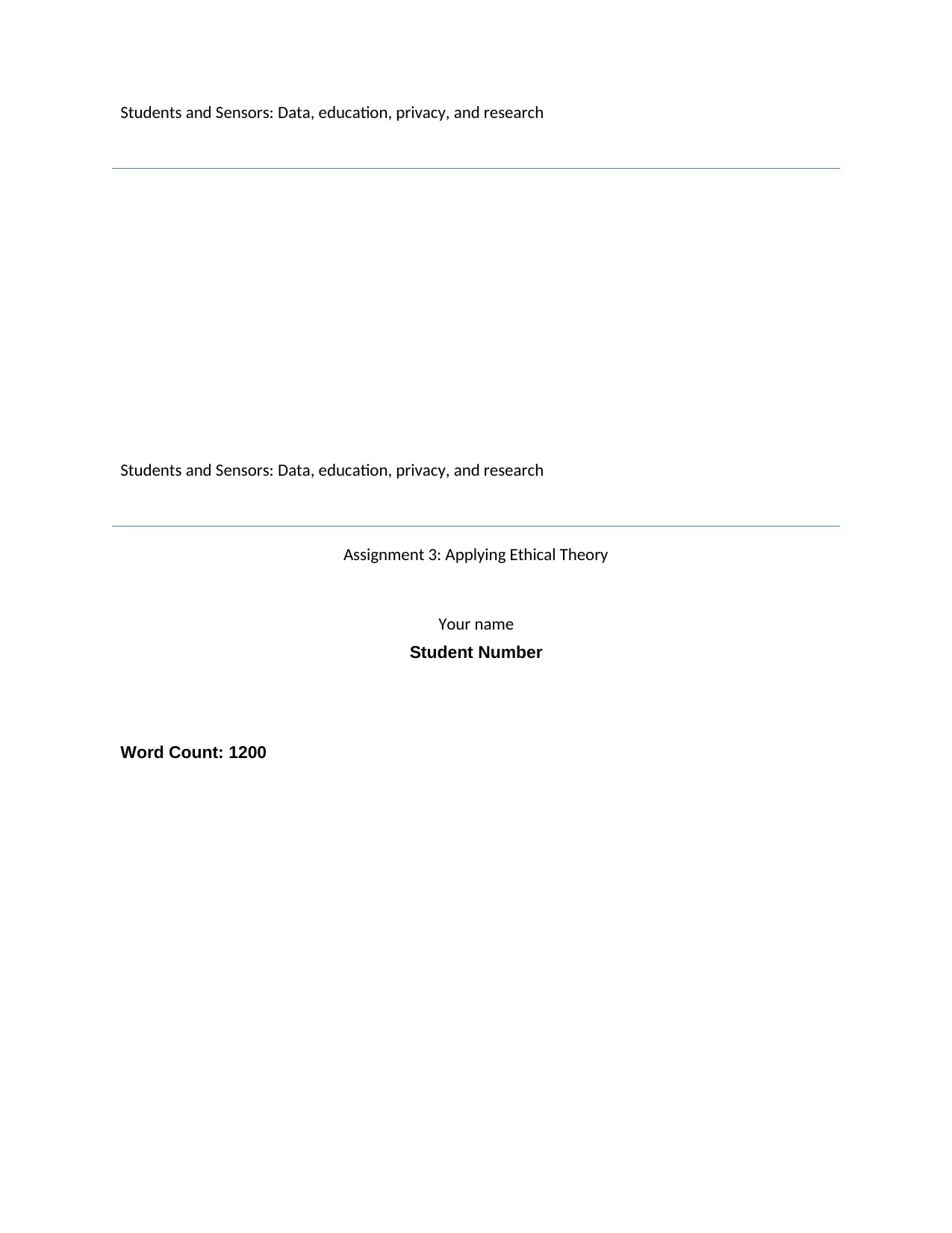
Students and Sensors: Data, education, privacy, and research
Students and Sensors: Data, education, privacy, and research
Assignment 3: Applying Ethical Theory
Your name
Student Number
Word Count: 1200
Students and Sensors: Data, education, privacy, and research
Assignment 3: Applying Ethical Theory
Your name
Student Number
Word Count: 1200
Paraphrase This Document
Need a fresh take? Get an instant paraphrase of this document with our AI Paraphraser
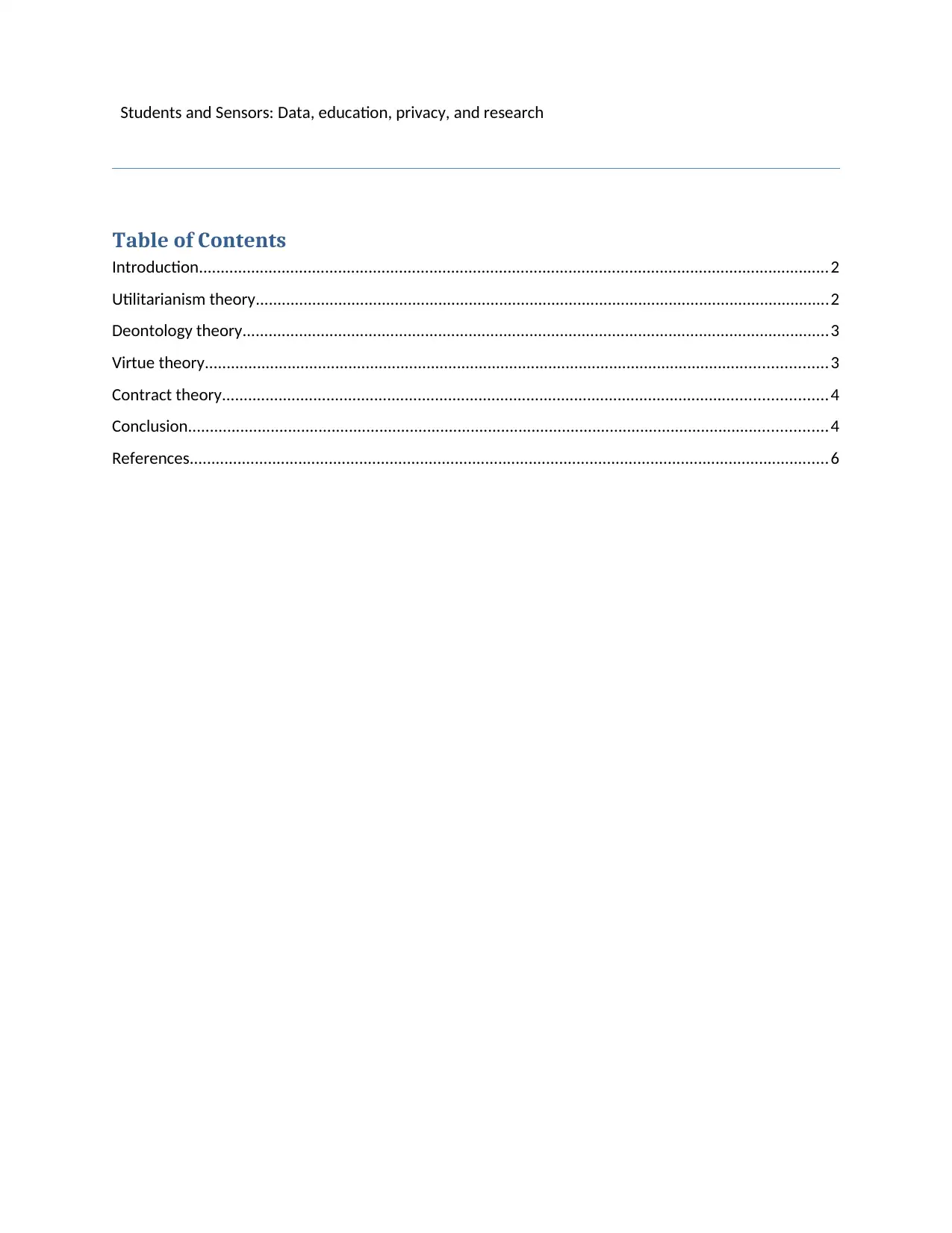
Students and Sensors: Data, education, privacy, and research
Table of Contents
Introduction.................................................................................................................................................2
Utilitarianism theory....................................................................................................................................2
Deontology theory.......................................................................................................................................3
Virtue theory...............................................................................................................................................3
Contract theory...........................................................................................................................................4
Conclusion...................................................................................................................................................4
References...................................................................................................................................................6
Table of Contents
Introduction.................................................................................................................................................2
Utilitarianism theory....................................................................................................................................2
Deontology theory.......................................................................................................................................3
Virtue theory...............................................................................................................................................3
Contract theory...........................................................................................................................................4
Conclusion...................................................................................................................................................4
References...................................................................................................................................................6

Students and Sensors: Data, education, privacy, and research
⊘ This is a preview!⊘
Do you want full access?
Subscribe today to unlock all pages.

Trusted by 1+ million students worldwide
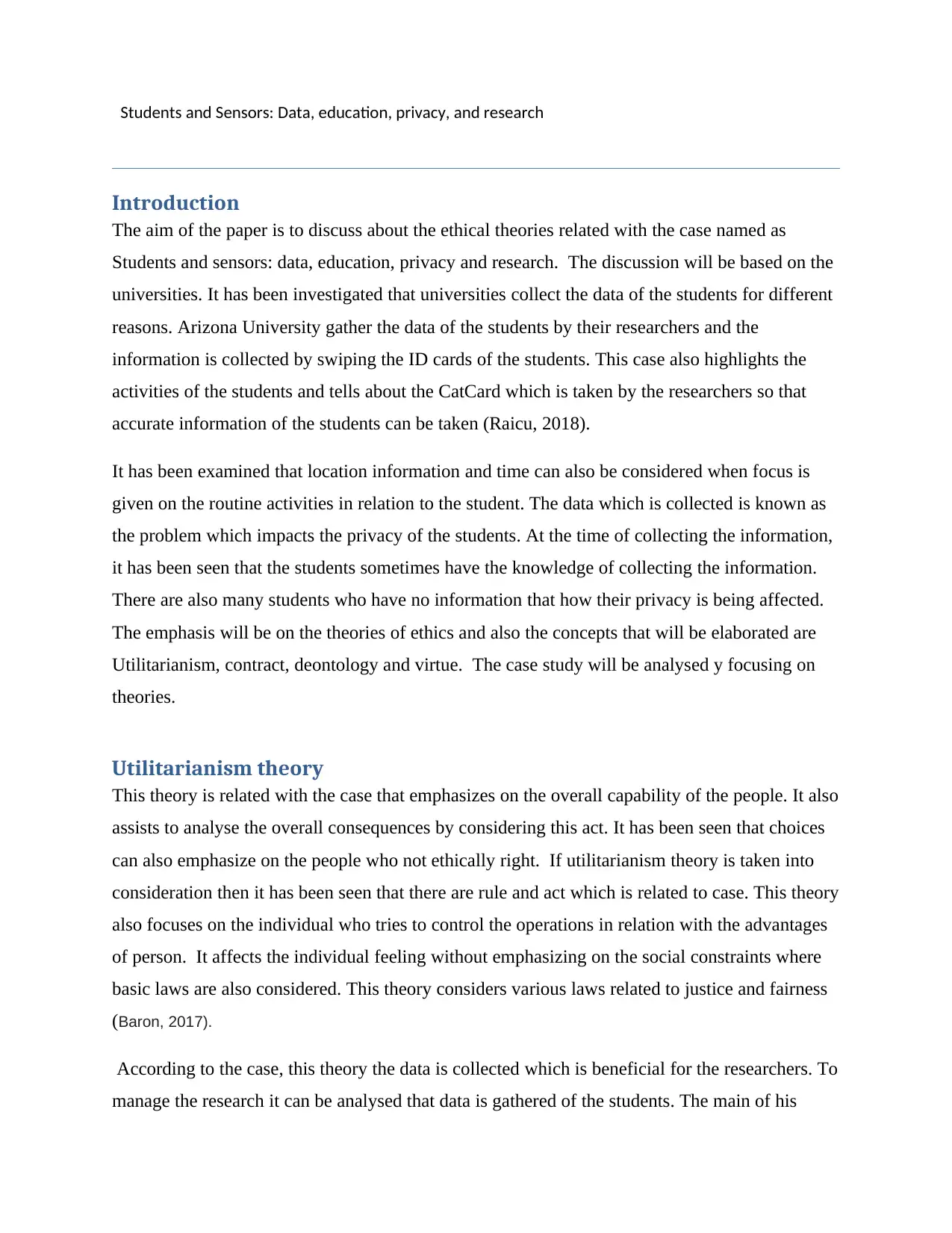
Students and Sensors: Data, education, privacy, and research
Introduction
The aim of the paper is to discuss about the ethical theories related with the case named as
Students and sensors: data, education, privacy and research. The discussion will be based on the
universities. It has been investigated that universities collect the data of the students for different
reasons. Arizona University gather the data of the students by their researchers and the
information is collected by swiping the ID cards of the students. This case also highlights the
activities of the students and tells about the CatCard which is taken by the researchers so that
accurate information of the students can be taken (Raicu, 2018).
It has been examined that location information and time can also be considered when focus is
given on the routine activities in relation to the student. The data which is collected is known as
the problem which impacts the privacy of the students. At the time of collecting the information,
it has been seen that the students sometimes have the knowledge of collecting the information.
There are also many students who have no information that how their privacy is being affected.
The emphasis will be on the theories of ethics and also the concepts that will be elaborated are
Utilitarianism, contract, deontology and virtue. The case study will be analysed y focusing on
theories.
Utilitarianism theory
This theory is related with the case that emphasizes on the overall capability of the people. It also
assists to analyse the overall consequences by considering this act. It has been seen that choices
can also emphasize on the people who not ethically right. If utilitarianism theory is taken into
consideration then it has been seen that there are rule and act which is related to case. This theory
also focuses on the individual who tries to control the operations in relation with the advantages
of person. It affects the individual feeling without emphasizing on the social constraints where
basic laws are also considered. This theory considers various laws related to justice and fairness
(Baron, 2017).
According to the case, this theory the data is collected which is beneficial for the researchers. To
manage the research it can be analysed that data is gathered of the students. The main of his
Introduction
The aim of the paper is to discuss about the ethical theories related with the case named as
Students and sensors: data, education, privacy and research. The discussion will be based on the
universities. It has been investigated that universities collect the data of the students for different
reasons. Arizona University gather the data of the students by their researchers and the
information is collected by swiping the ID cards of the students. This case also highlights the
activities of the students and tells about the CatCard which is taken by the researchers so that
accurate information of the students can be taken (Raicu, 2018).
It has been examined that location information and time can also be considered when focus is
given on the routine activities in relation to the student. The data which is collected is known as
the problem which impacts the privacy of the students. At the time of collecting the information,
it has been seen that the students sometimes have the knowledge of collecting the information.
There are also many students who have no information that how their privacy is being affected.
The emphasis will be on the theories of ethics and also the concepts that will be elaborated are
Utilitarianism, contract, deontology and virtue. The case study will be analysed y focusing on
theories.
Utilitarianism theory
This theory is related with the case that emphasizes on the overall capability of the people. It also
assists to analyse the overall consequences by considering this act. It has been seen that choices
can also emphasize on the people who not ethically right. If utilitarianism theory is taken into
consideration then it has been seen that there are rule and act which is related to case. This theory
also focuses on the individual who tries to control the operations in relation with the advantages
of person. It affects the individual feeling without emphasizing on the social constraints where
basic laws are also considered. This theory considers various laws related to justice and fairness
(Baron, 2017).
According to the case, this theory the data is collected which is beneficial for the researchers. To
manage the research it can be analysed that data is gathered of the students. The main of his
Paraphrase This Document
Need a fresh take? Get an instant paraphrase of this document with our AI Paraphraser
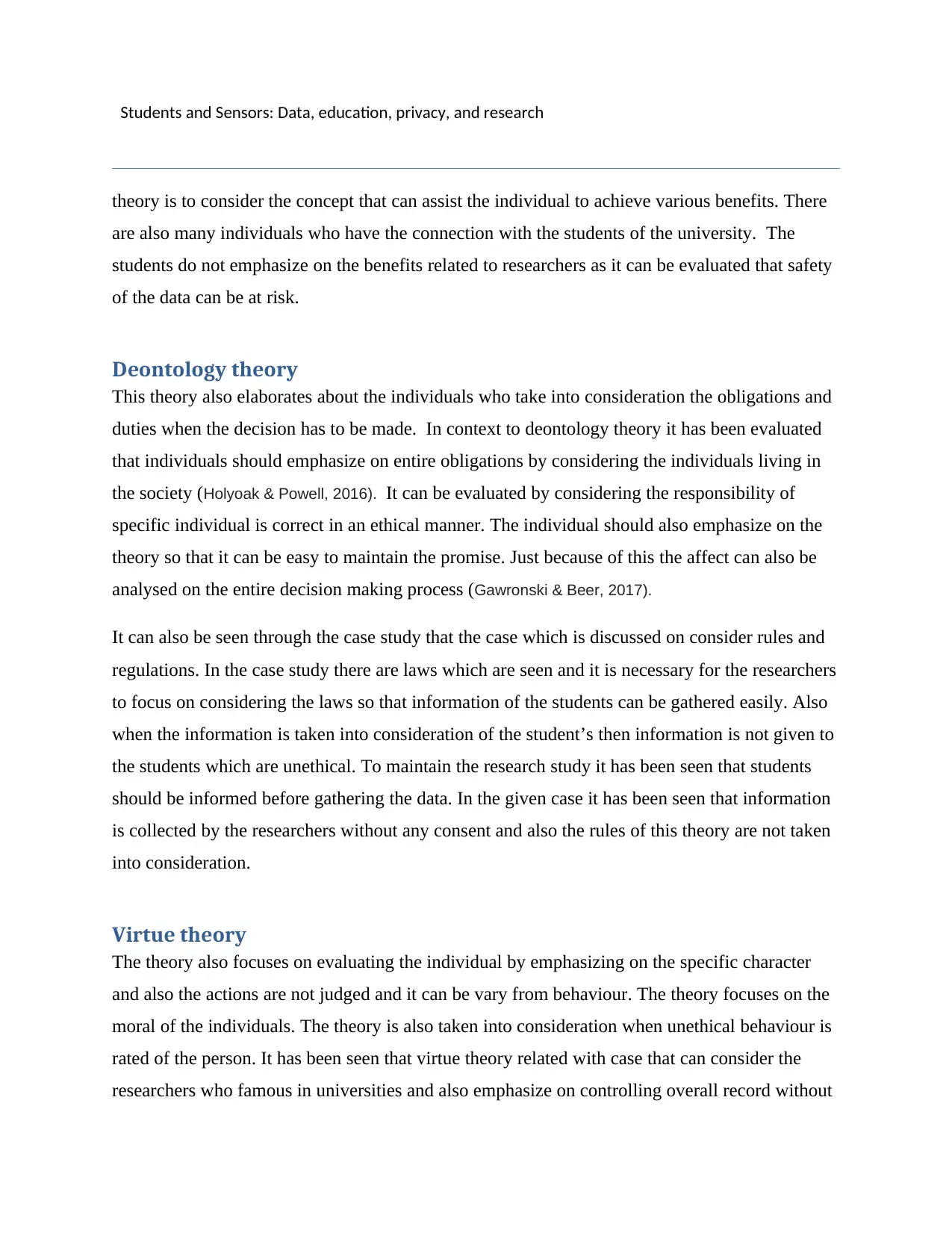
Students and Sensors: Data, education, privacy, and research
theory is to consider the concept that can assist the individual to achieve various benefits. There
are also many individuals who have the connection with the students of the university. The
students do not emphasize on the benefits related to researchers as it can be evaluated that safety
of the data can be at risk.
Deontology theory
This theory also elaborates about the individuals who take into consideration the obligations and
duties when the decision has to be made. In context to deontology theory it has been evaluated
that individuals should emphasize on entire obligations by considering the individuals living in
the society (Holyoak & Powell, 2016). It can be evaluated by considering the responsibility of
specific individual is correct in an ethical manner. The individual should also emphasize on the
theory so that it can be easy to maintain the promise. Just because of this the affect can also be
analysed on the entire decision making process (Gawronski & Beer, 2017).
It can also be seen through the case study that the case which is discussed on consider rules and
regulations. In the case study there are laws which are seen and it is necessary for the researchers
to focus on considering the laws so that information of the students can be gathered easily. Also
when the information is taken into consideration of the student’s then information is not given to
the students which are unethical. To maintain the research study it has been seen that students
should be informed before gathering the data. In the given case it has been seen that information
is collected by the researchers without any consent and also the rules of this theory are not taken
into consideration.
Virtue theory
The theory also focuses on evaluating the individual by emphasizing on the specific character
and also the actions are not judged and it can be vary from behaviour. The theory focuses on the
moral of the individuals. The theory is also taken into consideration when unethical behaviour is
rated of the person. It has been seen that virtue theory related with case that can consider the
researchers who famous in universities and also emphasize on controlling overall record without
theory is to consider the concept that can assist the individual to achieve various benefits. There
are also many individuals who have the connection with the students of the university. The
students do not emphasize on the benefits related to researchers as it can be evaluated that safety
of the data can be at risk.
Deontology theory
This theory also elaborates about the individuals who take into consideration the obligations and
duties when the decision has to be made. In context to deontology theory it has been evaluated
that individuals should emphasize on entire obligations by considering the individuals living in
the society (Holyoak & Powell, 2016). It can be evaluated by considering the responsibility of
specific individual is correct in an ethical manner. The individual should also emphasize on the
theory so that it can be easy to maintain the promise. Just because of this the affect can also be
analysed on the entire decision making process (Gawronski & Beer, 2017).
It can also be seen through the case study that the case which is discussed on consider rules and
regulations. In the case study there are laws which are seen and it is necessary for the researchers
to focus on considering the laws so that information of the students can be gathered easily. Also
when the information is taken into consideration of the student’s then information is not given to
the students which are unethical. To maintain the research study it has been seen that students
should be informed before gathering the data. In the given case it has been seen that information
is collected by the researchers without any consent and also the rules of this theory are not taken
into consideration.
Virtue theory
The theory also focuses on evaluating the individual by emphasizing on the specific character
and also the actions are not judged and it can be vary from behaviour. The theory focuses on the
moral of the individuals. The theory is also taken into consideration when unethical behaviour is
rated of the person. It has been seen that virtue theory related with case that can consider the
researchers who famous in universities and also emphasize on controlling overall record without
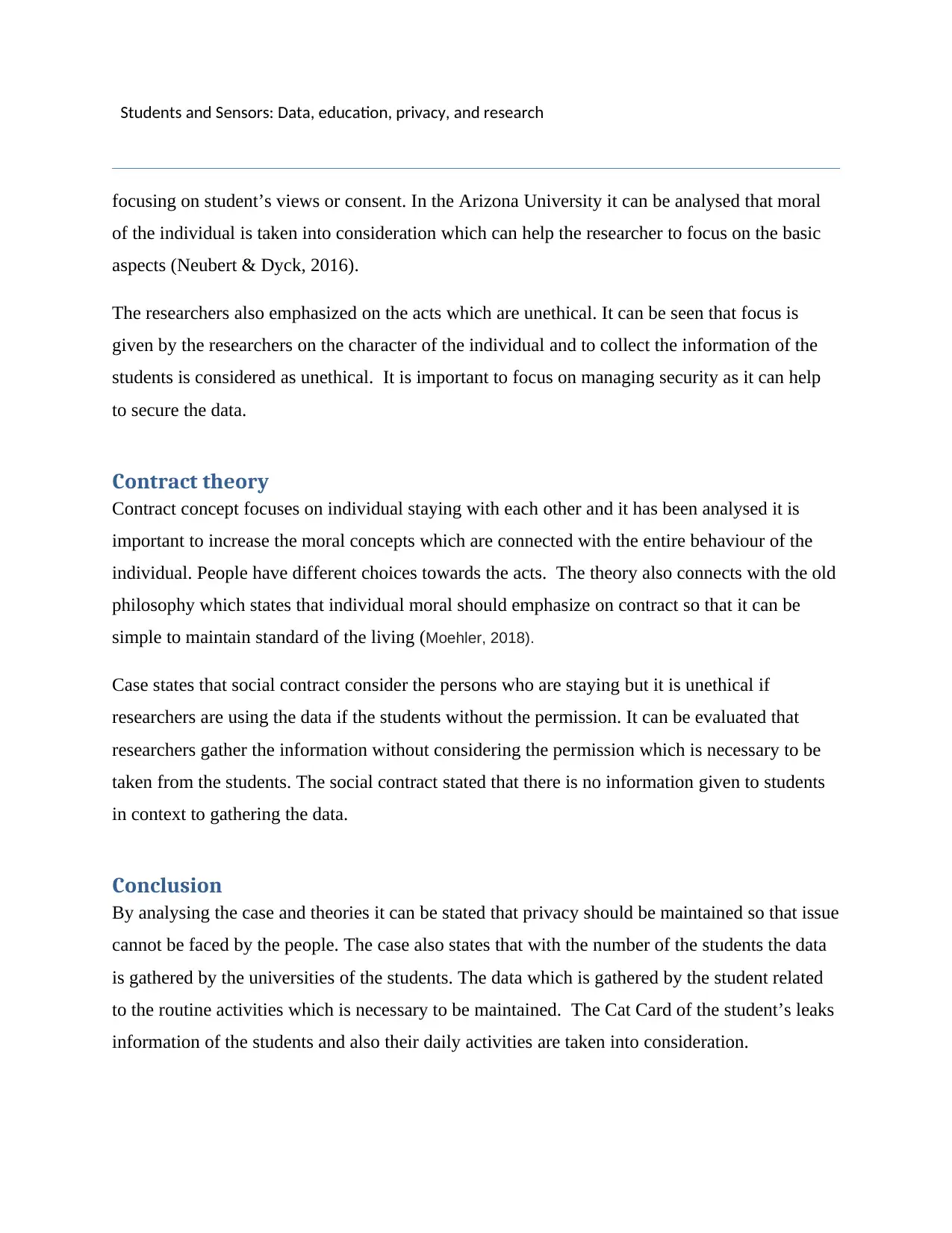
Students and Sensors: Data, education, privacy, and research
focusing on student’s views or consent. In the Arizona University it can be analysed that moral
of the individual is taken into consideration which can help the researcher to focus on the basic
aspects (Neubert & Dyck, 2016).
The researchers also emphasized on the acts which are unethical. It can be seen that focus is
given by the researchers on the character of the individual and to collect the information of the
students is considered as unethical. It is important to focus on managing security as it can help
to secure the data.
Contract theory
Contract concept focuses on individual staying with each other and it has been analysed it is
important to increase the moral concepts which are connected with the entire behaviour of the
individual. People have different choices towards the acts. The theory also connects with the old
philosophy which states that individual moral should emphasize on contract so that it can be
simple to maintain standard of the living (Moehler, 2018).
Case states that social contract consider the persons who are staying but it is unethical if
researchers are using the data if the students without the permission. It can be evaluated that
researchers gather the information without considering the permission which is necessary to be
taken from the students. The social contract stated that there is no information given to students
in context to gathering the data.
Conclusion
By analysing the case and theories it can be stated that privacy should be maintained so that issue
cannot be faced by the people. The case also states that with the number of the students the data
is gathered by the universities of the students. The data which is gathered by the student related
to the routine activities which is necessary to be maintained. The Cat Card of the student’s leaks
information of the students and also their daily activities are taken into consideration.
focusing on student’s views or consent. In the Arizona University it can be analysed that moral
of the individual is taken into consideration which can help the researcher to focus on the basic
aspects (Neubert & Dyck, 2016).
The researchers also emphasized on the acts which are unethical. It can be seen that focus is
given by the researchers on the character of the individual and to collect the information of the
students is considered as unethical. It is important to focus on managing security as it can help
to secure the data.
Contract theory
Contract concept focuses on individual staying with each other and it has been analysed it is
important to increase the moral concepts which are connected with the entire behaviour of the
individual. People have different choices towards the acts. The theory also connects with the old
philosophy which states that individual moral should emphasize on contract so that it can be
simple to maintain standard of the living (Moehler, 2018).
Case states that social contract consider the persons who are staying but it is unethical if
researchers are using the data if the students without the permission. It can be evaluated that
researchers gather the information without considering the permission which is necessary to be
taken from the students. The social contract stated that there is no information given to students
in context to gathering the data.
Conclusion
By analysing the case and theories it can be stated that privacy should be maintained so that issue
cannot be faced by the people. The case also states that with the number of the students the data
is gathered by the universities of the students. The data which is gathered by the student related
to the routine activities which is necessary to be maintained. The Cat Card of the student’s leaks
information of the students and also their daily activities are taken into consideration.
⊘ This is a preview!⊘
Do you want full access?
Subscribe today to unlock all pages.

Trusted by 1+ million students worldwide
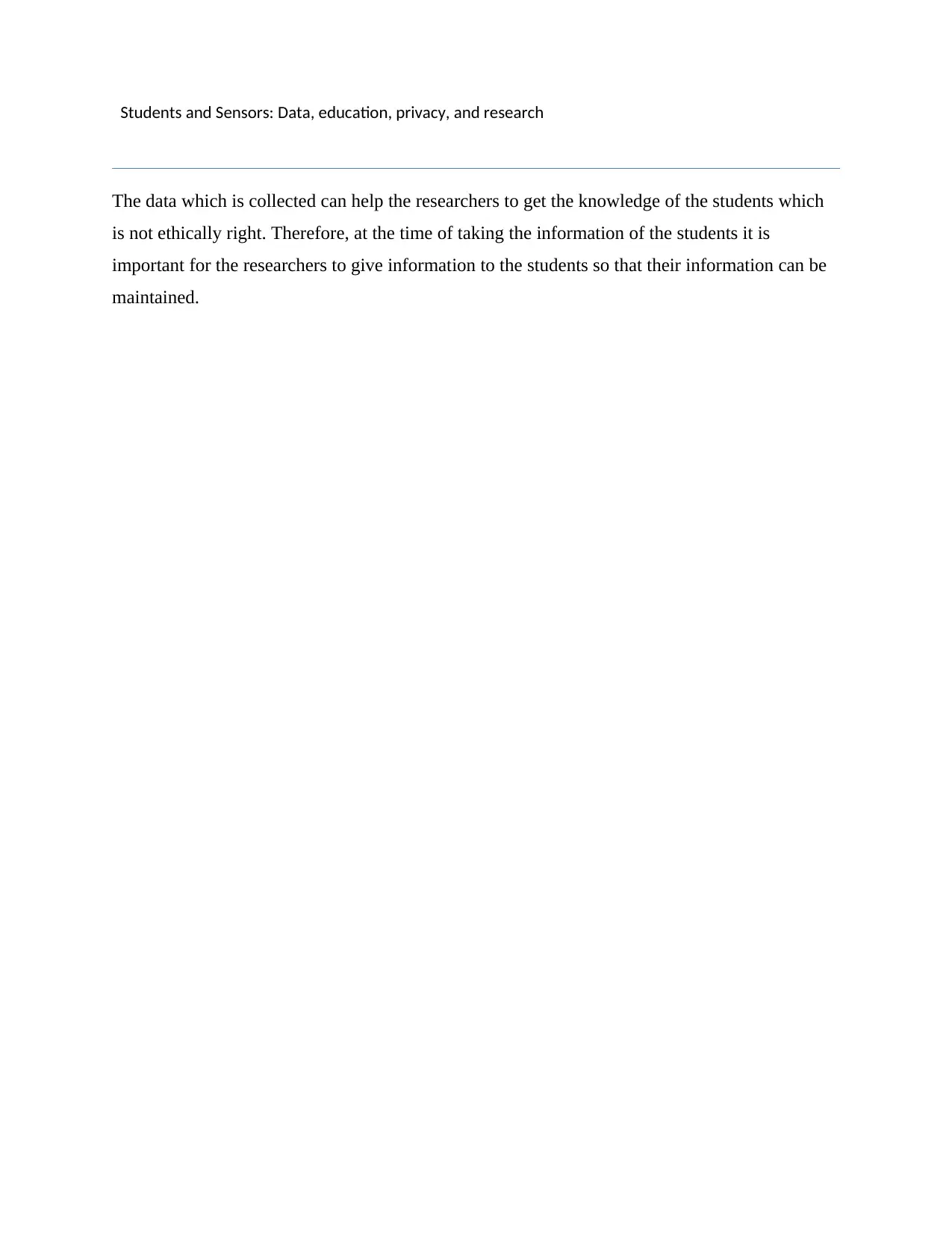
Students and Sensors: Data, education, privacy, and research
The data which is collected can help the researchers to get the knowledge of the students which
is not ethically right. Therefore, at the time of taking the information of the students it is
important for the researchers to give information to the students so that their information can be
maintained.
The data which is collected can help the researchers to get the knowledge of the students which
is not ethically right. Therefore, at the time of taking the information of the students it is
important for the researchers to give information to the students so that their information can be
maintained.
Paraphrase This Document
Need a fresh take? Get an instant paraphrase of this document with our AI Paraphraser
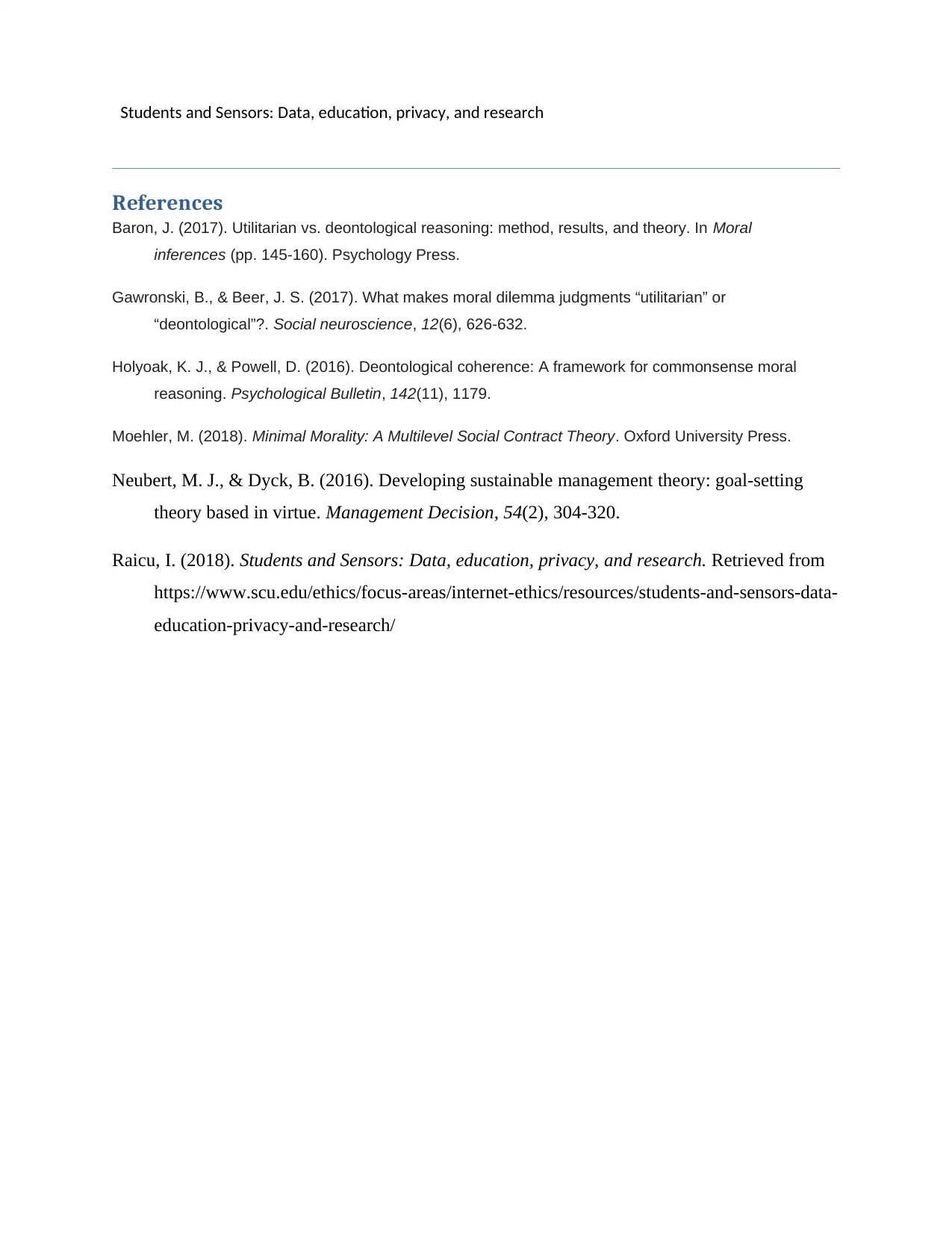
Students and Sensors: Data, education, privacy, and research
References
Baron, J. (2017). Utilitarian vs. deontological reasoning: method, results, and theory. In Moral
inferences (pp. 145-160). Psychology Press.
Gawronski, B., & Beer, J. S. (2017). What makes moral dilemma judgments “utilitarian” or
“deontological”?. Social neuroscience, 12(6), 626-632.
Holyoak, K. J., & Powell, D. (2016). Deontological coherence: A framework for commonsense moral
reasoning. Psychological Bulletin, 142(11), 1179.
Moehler, M. (2018). Minimal Morality: A Multilevel Social Contract Theory. Oxford University Press.
Neubert, M. J., & Dyck, B. (2016). Developing sustainable management theory: goal-setting
theory based in virtue. Management Decision, 54(2), 304-320.
Raicu, I. (2018). Students and Sensors: Data, education, privacy, and research. Retrieved from
https://www.scu.edu/ethics/focus-areas/internet-ethics/resources/students-and-sensors-data-
education-privacy-and-research/
References
Baron, J. (2017). Utilitarian vs. deontological reasoning: method, results, and theory. In Moral
inferences (pp. 145-160). Psychology Press.
Gawronski, B., & Beer, J. S. (2017). What makes moral dilemma judgments “utilitarian” or
“deontological”?. Social neuroscience, 12(6), 626-632.
Holyoak, K. J., & Powell, D. (2016). Deontological coherence: A framework for commonsense moral
reasoning. Psychological Bulletin, 142(11), 1179.
Moehler, M. (2018). Minimal Morality: A Multilevel Social Contract Theory. Oxford University Press.
Neubert, M. J., & Dyck, B. (2016). Developing sustainable management theory: goal-setting
theory based in virtue. Management Decision, 54(2), 304-320.
Raicu, I. (2018). Students and Sensors: Data, education, privacy, and research. Retrieved from
https://www.scu.edu/ethics/focus-areas/internet-ethics/resources/students-and-sensors-data-
education-privacy-and-research/
1 out of 8
Related Documents
Your All-in-One AI-Powered Toolkit for Academic Success.
+13062052269
info@desklib.com
Available 24*7 on WhatsApp / Email
![[object Object]](/_next/static/media/star-bottom.7253800d.svg)
Unlock your academic potential
Copyright © 2020–2025 A2Z Services. All Rights Reserved. Developed and managed by ZUCOL.



